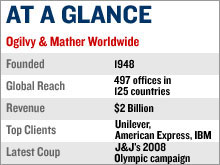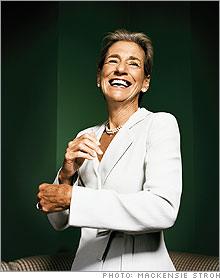A Madison Avenue maven speaks outShelly Lazarus, the CEO of advertising agency Ogilvy & Mather, answers your web questions about the branding business and her legendary career.(Fortune Magazine) -- She's best known for building other people's brands, but Lazarus herself is one of the biggest names in advertising. With a blue-chip client roster that's the envy of Madison Avenue, the head of WPP's (Charts) Ogilvy & Mather runs one of the most prestigious agencies in the world. Fortune's Matthew Boyle asked her your questions - and ours - on everything from Mattel's recall crisis to what it's like to be on the GE (Charts, Fortune 500) board. With the ad and media sectors in chaos, what do you see as the industry's strongest asset to weather this change? - Rob Shwetz, Sydney, Australia
 Questions for... Martha Stewart
Author, TV host, and the founder of Martha Stewart Omnimedia answers your questions in the Dec. 8 issue of Fortune.
Now's your chance to ask Stewart about launching your own company, how the market turmoil has impacted her empire, and what’s next for the titan of homemaking? Previous Q&As
One thing hasn't changed at all and never will, and that's the importance of a big idea. That's the real value we bring to clients. You can put it on the Internet or [on a billboard] in Times Square, but you have to have an idea to begin with. It's the one thing that will survive. Many companies are turning to experiential marketing. Are you a big believer in that? - Name withheld, Boston We're living in a world now where consumers are bombarded with thousands of commercial messages - they're everywhere you look. Unless you can cut through that and engage someone, I think you are lost. Consumers are now clearly in control. They control what they hear and see, when, and where. You have to find ways to allow them to actively engage with you, or the money you spend is wasted. Dove [a Unilever (Charts) brand] is a good example of that engagement. The Campaign for Real Beauty started as an idea based on creating a dialogue with women about how they define beauty. To get people talking, we used interactive billboards like the one in Times Square, where you could vote on your cellphone about whether the woman [in the ad] was wrinkled or beautiful. There was also a web video called "Evolution" that was posted on Dove's website and then on YouTube. The video started as a way to stimulate conversation among girls in Canada who were invited to self-esteem workshops that Dove sponsored. We estimate that more than 400 million people have now been exposed to that message. How is your work for companies like IBM, American Express, or Johnson & Johnson (Charts, Fortune 500) helping America's image in the world today? How are you adjusting your work to account for current foreign perceptions of the U.S.? - Dalia Daniel, Dallas Those are global brands. They might have headquarters in the U.S., but we don't think of them as American brands. We're always aware of the possibility that anti-American sentiment could color the response to our ads, but we try to start with a core idea and then interpret that idea for each geography so it's relevant. For American Express (Charts, Fortune 500), we do a campaign called "My life, my card" that portrays celebrities. Each country has its own. In Japan they use people like [actor] Ken Watanabe. When I started, you would just send out translations to other countries. Years ago we translated a print ad into 18th-century German, and nobody here knew. Now we're much more sensitive to cultural and geographic differences. What would you identify as your most meaningful accomplishment and as your biggest disappointment? - Creed Terry, Eagle Point, Ore. My biggest accomplishment was when I left Ogilvy's direct-marketing arm to return as head of the agency's headquarters at a time when the agency wasn't very healthy. It was after we were hostilely taken over [by WPP Group], but the agency wasn't in good shape even before that. We were losing clients and people every week, it seemed. I had nightmares that I would come in and all our clients and employees would have left. But we turned the whole agency around. And we did it with the people who were there. We didn't bring new leaders in. I figured if you could divide up the tasks into small enough pieces so that a person could say, 'Yeah, I could do that,' it could work. Anytime I lose a client is a disappointment. I take it personally. I feel a true obligation to every client, and when we are fired, I feel personally responsible. Who has served as your mentor over the years? - Thana R. Narashiman, Dallas The great thing about my job is that I've gotten to work with so many great CEOs. I take little things from each. One thing I learned from Lou Gerstner when he was at both American Express and IBM is the importance of picking a strategy and then sticking to it. Overall, David Ogilvy [our founder] was really my mentor, even when he was retired and living in France. What advice would you give today's presidential candidates? - Douglas Kim, Mahopac, N.Y. Don't underestimate the value people place on authenticity. Politicians listen to the focus groups and say the things they think people want to hear. But after 30 years of reading consumers, I know that they can smell phonies. Fortune's Matthew Boyle asks: Ogilvy scored a big win when J&J hired your firm for the 2008 Olympics. What's in store for Beijing? J&J is taking the opportunity to tell the Chinese people what it's all about and what its role in the world is. China is looking at it as their coming-out party as well. Speaking of China, you work with Mattel (Charts, Fortune 500) - which is suffering from the fallout from its recent recalls - on its Barbie account. What do you think it should be doing? I don't believe that this is a situation where advertising - certainly alone - is the right course of action, especially as news changes on a daily basis. I am a great believer in the power of public relations, working closely with news outlets as events change. Do you think the recalls will damage Chinese companies and brands over the long run? I think China has a set of reputation issues that they have to deal with strongly right now. It does not have to mean that in the long term they have lost people's trust, but I think they run the risk of that if they do not deal directly with these issues now. And I think they are. You're on the board of GE, a high-achievers club that includes A.G. Lafley, Sam Nunn, and Andrea Jung. What's it like during meetings? Can you get a word in edgewise? It's a board where people feel free to speak their mind and debate issues. To me that's a sign of health. We come from so many different backgrounds that it's fascinating to listen to everyone and hear how they assess an issue. Every six weeks I get a review of the global economy. |
Sponsors
| ||||||||||||||



